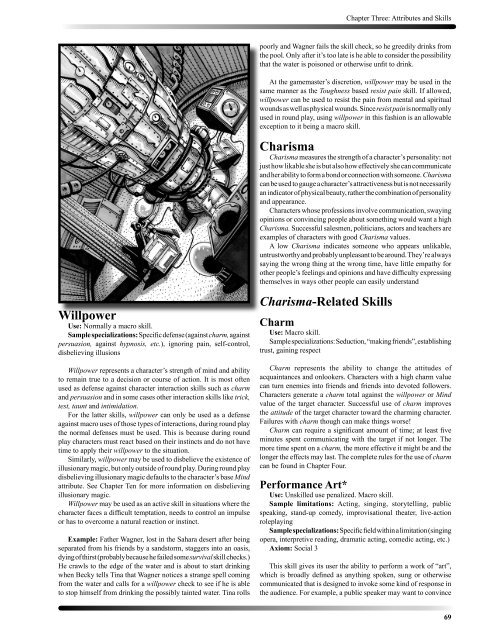Torg Player Rules
Torg Player Rules
Torg Player Rules
You also want an ePaper? Increase the reach of your titles
YUMPU automatically turns print PDFs into web optimized ePapers that Google loves.
Willpower<br />
Use: Normally a macro skill.<br />
Sample specializations: Specific defense (against charm, against<br />
persuasion, against hypnosis, etc.), ignoring pain, self-control,<br />
disbelieving illusions<br />
Willpower represents a character’s strength of mind and ability<br />
to remain true to a decision or course of action. It is most often<br />
used as defense against character interaction skills such as charm<br />
and persuasion and in some cases other interaction skills like trick,<br />
test, taunt and intimidation.<br />
For the latter skills, willpower can only be used as a defense<br />
against macro uses of those types of interactions, during round play<br />
the normal defenses must be used. This is because during round<br />
play characters must react based on their instincts and do not have<br />
time to apply their willpower to the situation.<br />
Similarly, willpower may be used to disbelieve the existence of<br />
illusionary magic, but only outside of round play. During round play<br />
disbelieving illusionary magic defaults to the character’s base Mind<br />
attribute. See Chapter Ten for more information on disbelieving<br />
illusionary magic.<br />
Willpower may be used as an active skill in situations where the<br />
character faces a difficult temptation, needs to control an impulse<br />
or has to overcome a natural reaction or instinct.<br />
Example: Father Wagner, lost in the Sahara desert after being<br />
separated from his friends by a sandstorm, staggers into an oasis,<br />
dying of thirst (probably because he failed some survival skill checks.)<br />
He crawls to the edge of the water and is about to start drinking<br />
when Becky tells Tina that Wagner notices a strange spell coming<br />
from the water and calls for a willpower check to see if he is able<br />
to stop himself from drinking the possibly tainted water. Tina rolls<br />
Chapter Three: Attributes and Skills<br />
poorly and Wagner fails the skill check, so he greedily drinks from<br />
the pool. Only after it’s too late is he able to consider the possibility<br />
that the water is poisoned or otherwise unfit to drink.<br />
At the gamemaster’s discretion, willpower may be used in the<br />
same manner as the Toughness based resist pain skill. If allowed,<br />
willpower can be used to resist the pain from mental and spiritual<br />
wounds as well as physical wounds. Since resist pain is normally only<br />
used in round play, using willpower in this fashion is an allowable<br />
exception to it being a macro skill.<br />
Charisma<br />
Charisma measures the strength of a character’s personality: not<br />
just how likable she is but also how effectively she can communicate<br />
and her ability to form a bond or connection with someone. Charisma<br />
can be used to gauge a character’s attractiveness but is not necessarily<br />
an indicator of physical beauty, rather the combination of personality<br />
and appearance.<br />
Characters whose professions involve communication, swaying<br />
opinions or convincing people about something would want a high<br />
Charisma. Successful salesmen, politicians, actors and teachers are<br />
examples of characters with good Charisma values.<br />
A low Charisma indicates someone who appears unlikable,<br />
untrustworthy and probably unpleasant to be around. They’re always<br />
saying the wrong thing at the wrong time, have little empathy for<br />
other people’s feelings and opinions and have difficulty expressing<br />
themselves in ways other people can easily understand<br />
Charisma-Related Skills<br />
Charm<br />
Use: Macro skill.<br />
Sample specializations: Seduction, “making friends”, establishing<br />
trust, gaining respect<br />
Charm represents the ability to change the attitudes of<br />
acquaintances and onlookers. Characters with a high charm value<br />
can turn enemies into friends and friends into devoted followers.<br />
Characters generate a charm total against the willpower or Mind<br />
value of the target character. Successful use of charm improves<br />
the attitude of the target character toward the charming character.<br />
Failures with charm though can make things worse!<br />
Charm can require a significant amount of time; at least five<br />
minutes spent communicating with the target if not longer. The<br />
more time spent on a charm, the more effective it might be and the<br />
longer the effects may last. The complete rules for the use of charm<br />
can be found in Chapter Four.<br />
Performance Art*<br />
Use: Unskilled use penalized. Macro skill.<br />
Sample limitations: Acting, singing, storytelling, public<br />
speaking, stand-up comedy, improvisational theater, live-action<br />
roleplaying<br />
Sample specializations: Specific field within a limitation (singing<br />
opera, interpretive reading, dramatic acting, comedic acting, etc.)<br />
Axiom: Social 3<br />
This skill gives its user the ability to perform a work of “art”,<br />
which is broadly defined as anything spoken, sung or otherwise<br />
communicated that is designed to invoke some kind of response in<br />
the audience. For example, a public speaker may want to convince<br />
69



